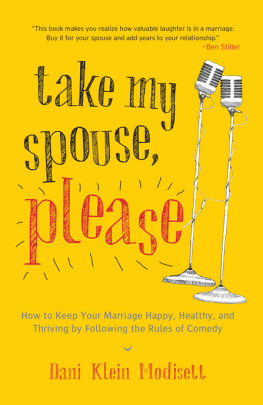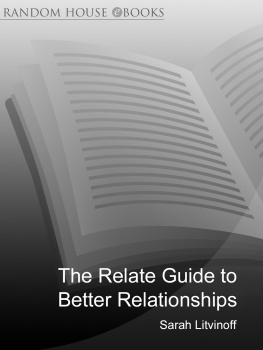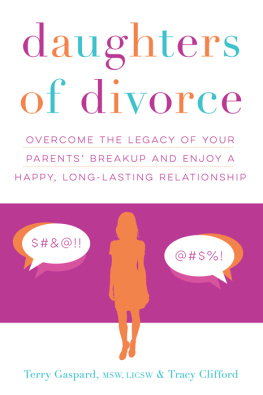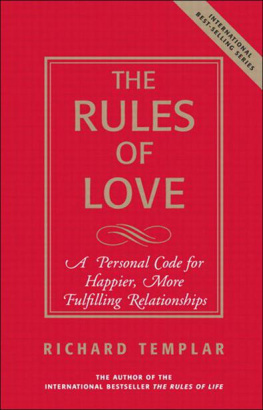THE DIRTY HALF DOZEN. Copyright 1991 by William Nagler, M.D., and Anne Androff. All rights reserved. No part of this book may be reproduced in any form or by any electronic or mechanical means, including information storage and retrieval systems, without permission in writing from the publisher, except by a reviewer who may quote brief passages in a review. For information address Warner Books, Hachette Book Group, 237 Park Avenue, New York, NY 10017.
A Time Warner Company ISBN: 978-0-7595-2176-6 A trade paperback edition of this book was published in 1992 by Warner Books.
The Warner Books name and logo are trademarks of Hachette Book Group, Inc. First eBook edition: May 2001 Visit our Web site at www.HachetteBookGroup.com 
 b y W i l l i a m N a g l e r , M . D . , a n d A n n e A n d r o f f
b y W i l l i a m N a g l e r , M . D . , a n d A n n e A n d r o f f  A Time Warner Company
A Time Warner Company
CONTENTS
DONT KEEP THE ROMANCE ALIVE. DONT FIGHT FAIR. DONT TALK ABOUT EVERYTHING.
DONT ALWAYS TELL THE TRUTH. DONT LET GO OF THE MONEY. DONT WORRY ABOUT WHAT YOU THINK IS IMPORTANT. Dedicated to the memory of J.V.M.,who taught me how to think.
INTRODUCTION
Lisa was a successful broker who was intelligent, caring, and very sexy. I was a psychiatrist who was deeply committed to our relationship. We talked openly and honestly about everything.
We shared every day. We worked at keeping our relationship alive. Lisa and I lived together for almost five years. But it ended in hell, or as close to hell as Id come in thirty-five years. At the end, we didnt talk, we just screamed. We didnt reason, we just raved.
And we didnt make love, we just had sex, and neither of us enjoyed it. We started to have problems about a year into our relationship, when we both began to lose interest in having sex quite so often. The fireworks had started to fade. Assuming that the problem might run deep, we sought professional help. Our therapist encouraged us to discuss everything with each other. So we began to air all of our feelings openly and honestly, and we strived to put the romance back in our lives.
We scheduled romantic weekends at rustic inns. We took breaks in the middle of the day to come home and make love. We followed all the traditional rules for intimacy and open, honest communication. And yet things got worse. The more we tried to be close, the further apart we drifted. We didnt know it then, but we were working our relationship to death.
This book began five years ago with the disintegration of my relationship with Lisa. I felt a need to make some sense of what had happened, and I wanted to discover why trying to make things better by using the traditional tricks of my psychiatric trade had led to so much hate, anger, and heartbreak. I needed to know why doing everything I had been taught to do to keep us together had failed. I began to look for patterns in my patients. Tami and Scott had come to me because they were having fierce arguments on a regular basis. They were deeply in love, and they wanted to stop fighting, because they knew it would bring them closer together.
So I taught them how to communicate openly and honestly with each other. A year later they filed for divorce. Judy and Billy sought my help because they were having problems with money. I taught them how to share and compromise, and sent them on their way. Their relationship ended in six months. My files were full of people I had driven apart, by teaching them what I had been taught would bring them closer together.
Clearly, something was wrong. Then I met a patient who changed the way I practiced psychiatry. Terri had been happily married for eight years, but she had just had a short-lived affair with a man she met through mutual friends. Her lover was a glamorous fashion designer, very romantic, attentive, and exciting to a slightly bored housewife with a busy husband and two small children. But after a few afternoons with her new lover, Terri realized that he was not what she wanted. She wanted her husband and family, and she swiftly ended the affair.
Terri was consumed with guilt and humiliation. She wanted to confess everything to her husband, to cleanse her soul and bring them closer. I started to encourage her to do so, because this was the open and honest thing to do. But as I looked more closely at her problem, I had a second thought. Terri and her husband werent apart. In fact, they got along fine.
Their relationship was terrific. Terris affair had been a spur-of-the-moment, thoughtless act, not the result of a troubled relationship. So, what would be the point of confession? What would a confession do to Terris relationship with her husband? It would break it, I thought. Her husband would be hurt and angry, and possibly vengeful and unforgiving. It occurred to me at that moment that total honesty was exactly what was not called for. So I said to Terri, You told me all about what happened.
And thats fine. But, dont tell your husband. There was a long pause, during which Terri looked at me as if I were a visitor from another planet. I broke it. Why do you think I dont want you to tell him? I asked her. No response.
Another pause. What effect do you think cleansing your soul will have on your husband? What do you think this disclosure will do to your relationship? Youre getting along fine now, as it is, I said. You had an affair, you ended it, and now you know whats important to you. Another pause. Keep your mouth shut, and get on with your life. She did, her relationship survived, and I knew I was on to something.
From that moment on, I began my quest to find out why trying to fix my own and other peoples relationships had actually driven people apart. For the first time in my career, I focused interpersonally, instead of intrapersonallyI looked at what was going on between people, instead of inside them. I took a look at open, honest communication, to see what it really did to relationships. I dug deep into the psychiatric literature to see what studies and research had been done about repairing relationships, and why repair almost always made things worse. By surveying more than thirty years of psychiatric literature, and submitting over a thousand studies on successful and unsuccessful relationships to a computerized factor analysis, I found something curious: There were six universal behavior patterns that were always present in relationships that fell apart. And these were the exact behaviors that I and other psychiatrists had been teaching people for years. We had been advising people to work on keeping romance alive, to fight fair, to talk out their problems, to always tell the truth, to make reasonable compromises about money, and to ignore the little things that bugged them in their relationships.
But by doing so we were inadvertently undermining the relationships we had been trying to save. Our advice tended to create tension and stress that werent there before. After analyzing the data on couples who had followed conventional psychiatric advice (and consequently failed in relationships), I took a look at couples who didnt follow conventional advice, and I made an even more startling discovery:











 A Time Warner Company ISBN: 978-0-7595-2176-6 A trade paperback edition of this book was published in 1992 by Warner Books.
A Time Warner Company ISBN: 978-0-7595-2176-6 A trade paperback edition of this book was published in 1992 by Warner Books. 
 b y W i l l i a m N a g l e r , M . D . , a n d A n n e A n d r o f f
b y W i l l i a m N a g l e r , M . D . , a n d A n n e A n d r o f f  A Time Warner Company
A Time Warner Company